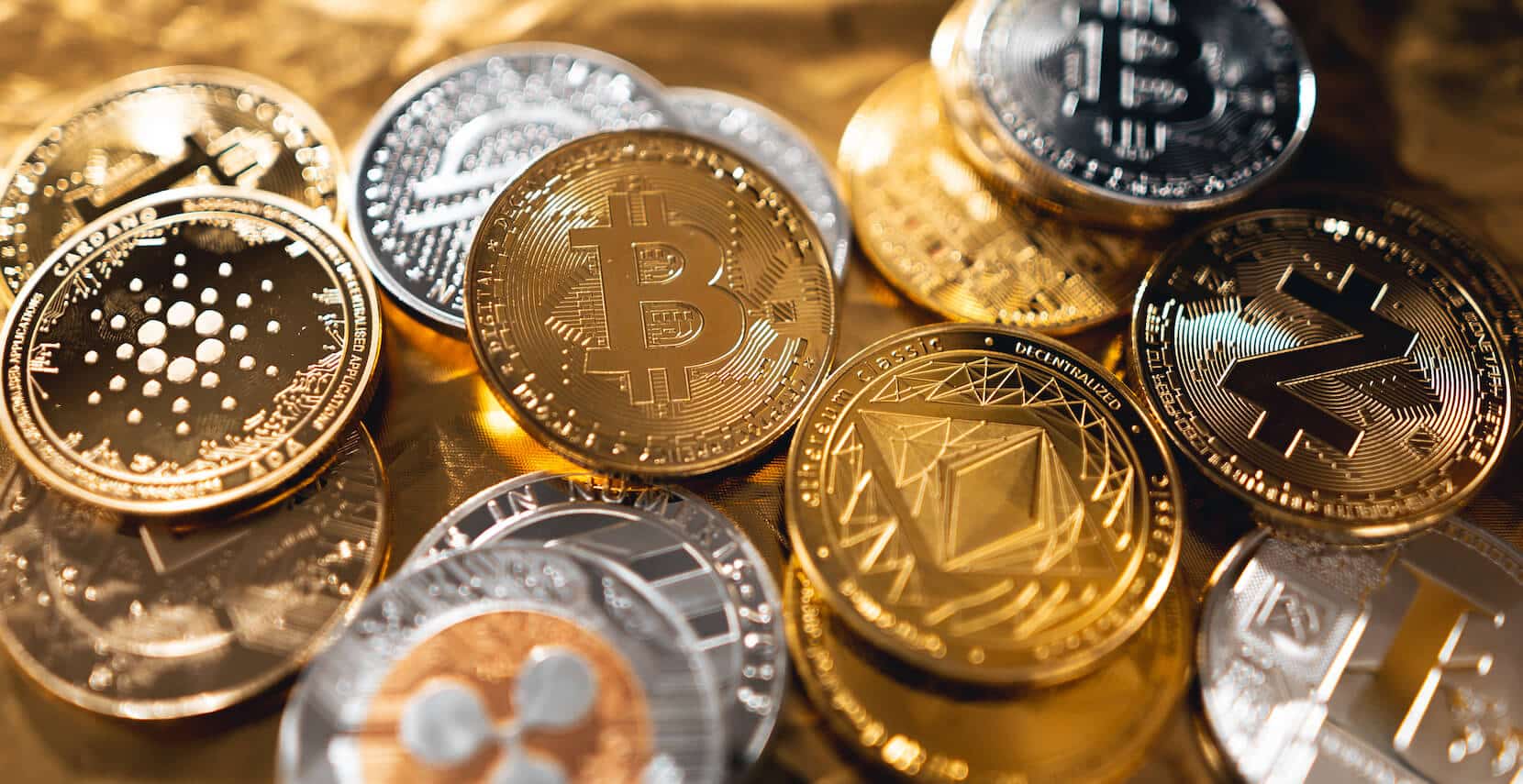Whether you were one of Bitcoin’s early adopters, or you're just starting to explore investing in crypto, one thing all investors need to understand is how cryptocurrency increases in value.
Fiat (government-based) currency values, such as the U.S. dollar, depend primarily on government regulations. On the other hand, cryptocurrency's decentralized monetary system is more challenging to track.

Several factors must be considered when determining how and why a coin or token’s value increases—including supply and demand, market competition, how cryptocurrency functions, and other factors.
Read on as our team at My Digital Money explores what cryptocurrency is, what types exist in today’s market, and what causes values to increase.
What Is Cryptocurrency?
Developers create cryptocurrencies as digital assets to serve as mediums of exchange on blockchain platforms. People around the globe use these digital currencies to pay for goods and services and conduct investment trading, with all actions and transactions recorded on the cryptocurrency’s internal blockchain. You can imagine a blockchain as a digital ledger that records the network’s transactions.
Blockchains use smart contracts to self-execute actions based on “if-then” conditions as they form blocks of data in chronological order. Each block of data in the blockchain is irreversibly connected. Blockchain technology facilitates fast transactions and offers many benefits across industries.
An increasingly popular form of currency, cryptocurrency allows users to avoid the processing fees and wait time associated with fiat currencies. Rather than waiting several days for an international monetary exchange to go through a bank, users can exchange cryptocurrency in a matter of moments.
Since Bitcoin’s introduction, tens of thousands of cryptocurrencies have emerged, pushing the market cap to $2 trillion as of March 2022. Users worldwide use cryptocurrencies daily to invest and pay for goods and services.
Types of Cryptocurrencies
Although you may hear the words coins and tokens used interchangeably in cryptocurrency discussions, they refer to two separate categories. Below, we briefly discuss the differences between cryptocurrency coins and tokens. We’ll also touch on what an altcoin is to help you avoid confusion while on your cryptocurrency journey.
Coins
A cryptocurrency coin, such as Bitcoin or Ether, is a fungible digital asset (essentially a string of code) that anyone can use or trade as currency. By fungible, we mean that each coin equals the exact value of another coin of the same type. A user may own hundreds of coins or even invest in a percentage of a single unit.
Cryptocurrency coins function on their own blockchains, serving their original monetary system function and providing developers with opportunities to explore other capabilities of blockchain technology. Users produce coins through mining and stalking.
Tokens
Unlike cryptocurrency coins, tokens serve functions beyond currency. Usually, cryptocurrency companies create tokens to crowdfund a new project through initial coin offerings (ICOs). Each token represents a specific value but not necessarily a monetary one.
Investors purchase cryptocurrency tokens the same way they would buy shares on the stock market. Each token offers a unique value or purpose, often representing ownership. For example, a token may represent a digital asset or a share in a company.
To differentiate between cryptocurrency coins and tokens, you can imagine coins as the primary digital asset of the blockchain and tokens as additional assets created on top of the existing blockchain to serve a particular purpose.
As a real-world example, we use dollars (coins) to purchase goods and services and deeds or vouchers (tokens) to claim ownership of goods and services. Your house deed indicates ownership of an asset, but it cannot be used as currency to pay for a new house.
Altcoins
The term altcoins refer to all cryptocurrencies and token alternatives to Bitcoin. Many altcoins use the Bitcoin framework with tweaks to particular traits or functions, while others use entirely different blockchain frameworks. For example, some altcoins use stalking for production rather than mining.
While the stalking process eliminates the need to race against the competition, miners must beat each other out to verify blocks in a blockchain. Stalkers verify transactions in order, each person waiting their turn. This newer form of coin production tends to cost less than mining because it doesn’t require the same computing power and electricity usage.
What Causes Cryptocurrency’s Value To Increase?
Unlike fiat currencies, cryptocurrencies don’t have backing from a central authority like a government, and exchanges don’t determine the value of each unit. Instead, prices vary based on seller-buyer relationships. We must consider this and other factors to answer the question: How does cryptocurrency increase in value?
If this seems confusing, consider how the price of gold depends on more than just the value of fiat currencies. It also depends on supply and demand, inflation, scarcity, and other factors. Cryptocurrency is not a tangible commodity like gold, but its price relies on several factors. These include the following:
Cost of Production
People create new cryptocurrencies through a process called mining. When mining for crypto, users compete with each other to verify the next block within the blockchain, for which they receive cryptocurrency rewards. Mining can get expensive because it requires increasingly specialized hardware as it becomes harder to mine the cryptocurrency.
Mining also becomes more costly as competition increases, and verifying blocks in the blockchain requires increased computing power. This trend causes the cryptocurrency to increase in value as demand increases and supply decreases.
Competition
For a cryptocurrency to gain value, it must gain users. For example, if a new blockchain offers application functionality unlike other cryptocurrencies, it may quickly gain traction and attract an extensive network of users. The value of this cryptocurrency will rise as users switch over from competing blockchains.
This competition driver can also rapidly decrease a cryptocurrency’s value if many users sell their coins or tokens at once.
Node Count
Node count refers to the number of active wallets on a blockchain network. In other words, a cryptocurrency’s node count measures how many users actively use that coin or token.
A high node count usually correlates with a greater value because users put more faith in cryptocurrencies with many users versus platforms with fewer users. Investors and traders want to see a stable community behind their cryptocurrencies. More nodes also mean more competition for that cryptocurrency, ultimately pushing the value up.
Cryptocurrency Supply and Demand
If an asset is tradable, its value will depend partly on supply and demand—and cryptocurrency is no exception. Demand for cryptocurrencies has continued to rise over the years as more applications offer users simple entry into the digital asset trading world. Even governments have begun adopting cryptocurrencies.
Most cryptocurrency creators place caps on how many coins or tokens miners can produce, limiting supply and driving up prices as the currency gains traction in the market.
However, we see this trend reverse when a cryptocurrency comes under scrutiny due to scams, hackers, or other unfavorable circumstances. Users begin to liquidate these cryptocurrencies, and as demand decreases, so do their values.
Inflation of Fiat Currencies
When fiat currencies face inflation and a decrease in value, their respective values in cryptocurrencies increase because investors can sell their coins and tokens for more fiat currency. For this reason, many investors have added cryptocurrencies to their investment portfolios to hedge against inflation.
Cryptocurrency acts a bit like gold in this way, acting more as a digital commodity than a form of currency and offering more potentially stable investment opportunities.
Cryptocurrency Exchanges
Cryptocurrency exchanges allow users to trade these digital assets and use them as investments. Cryptocurrencies increase in value when they become available on multiple exchanges, and more users purchase coins or tokens, raising the demand for a particular one. If users can only buy a cryptocurrency on a single exchange, it may struggle to gain value due to low demand.
Internal Governance
Some cryptocurrencies have adaptive rules to govern how the currency gets produced or what it gets used for, while others use more stable internal governance. Most investors prefer the latter because unstable rules can create equally unstable prices.
The more difficult it proves to change a rule of governance, the more stable the pricing will be for that particular cryptocurrency. However, when strict rules make it challenging to update ineffective protocols, the price may suffer.
This combination of factors creates a volatile cryptocurrency market, where prices can change drastically in seconds. We can use these considerations to predict values, but they do not provide hard-and-fast rules for how cryptocurrency values rise and fall.
How Can Individuals Impact the Value Of Cryptocurrency?
Cryptocurrency users affect coin and token values just as internal rules and external factors do. We’ll look at five ways investors, miners, and other users impact cryptocurrency prices.
Mining
Mining directly impacts cryptocurrency supply, demand, and competition, causing values to rise or fall. Users can cause cryptocurrency to increase in value through aggressive mining, assuming that users are interested in the coin, causing demand to grow and supply to decrease.
Media
With so many cryptocurrencies available in today’s market, social media represents one-way users can help a coin or token gain traction. Positive media coverage causes the prices of coins and tokens to increase, while negative press causes a downward trend. For example, many users may liquidate a coin after news of a scandal.
Day Trading
Day trading refers to buying and selling assets for a return within a single day, an increasingly popular cryptocurrency investment method. Investors follow price trends within the volatile cryptocurrency market to strategically purchase and sell coins and tokens.
Increasing Utility
Although cryptocurrencies began as a form of currency, people worldwide have discovered the many utilities of blockchain technologies and crypto. An increasing number of functionalities continue to expand the cryptocurrency market, from funding startups to using coins and tokens to purchase goods and services. Users contribute to a subsequent increase in prices by exploring these new utilities.
Stacking Cryptos
Many investors stack cryptocurrency investment methods to enjoy maximum gains. They may simultaneously purchase low-price crypto shares to hold until their value increases significantly and also participate in day trading (buying and selling cryptocurrencies within day-long periods).
Determining how cryptocurrencies increase in value remains a complex endeavor. Still, as these digital assets become increasingly popular worldwide, we may see governments and other regulatory bodies stepping in to put regulations in place and create a more centralized system.
Centralized regulation may lower cryptocurrency investment risks and limit transactions and subsequent profits. Ultimately, only time will tell.
So, Are You Ready To Start Investing in Crypto?
If you’re looking for a new way to invest in cryptocurrencies, you should open a crypto IRA with My Digital Money. We offer a secure platform for trading crypto in cash or investing for retirement in a crypto IRA. Whatever your cryptocurrency goals look like, we can help you get there.
Join the thousands of satisfied My Digital Money users who enjoy the ability to test strategies with a play money account. You can analyze price trends to answer the question, “How does cryptocurrency increase in value?” for yourself before trading with real money.
Our platform automatically allows users to set buying and selling conditions to purchase or sell cryptocurrency coins. For example, you can automatically sell a cryptocurrency coin if its price decreases by a specific percentage. Our platform can also help you set up your cryptocurrency IRA if you want a long-term crypto investment.
Learn more about the cryptocurrency platform MyDigitalMoney by contacting us online or calling us at 833-MDM-2008. We can’t wait to help you reach your cryptocurrency goals!




